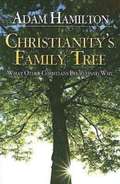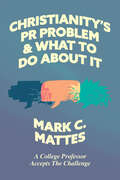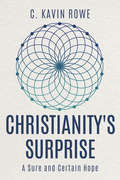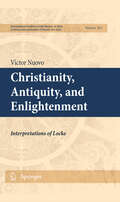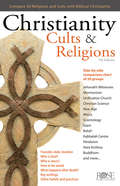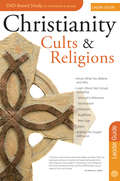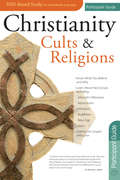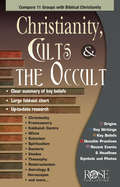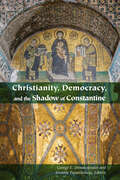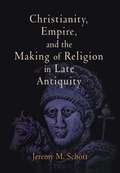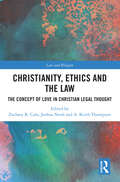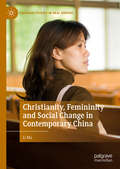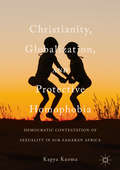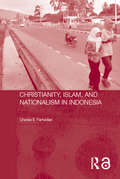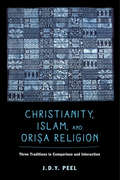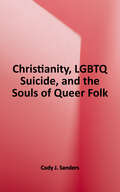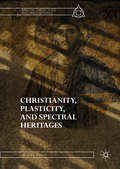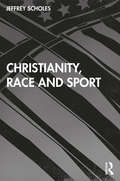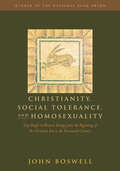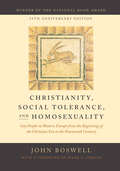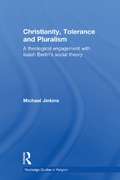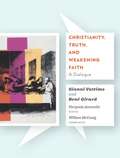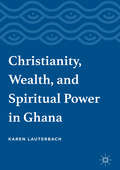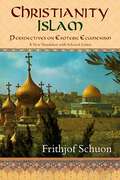- Table View
- List View
Christianity's Family Tree Participant's Guide: What Other Christians Believe and Why
by Adam HamiltonThis book is excellent for individual reading or can be used as the small group study book for the Christianity's Family Tree DVD based study.Adam Hamilton is, in my opinion, a national treasure. He embodies the kind of generous orthodoxy so many of us have been dreaming of and praying for. This book provides something truly unique—a kind of orientation to Christianity in its wide array of forms that not only educates but inspires. It’s one of the few books I wish every single Christian would read and share with their friends. - Brian McLaren, author of A New Kind of ChristianIn this wise and practical book, Adam Hamilton serves as a trusted guide to some of the rich diversity of Christian belief and practice. It is a rare feat to acknowledge differences and distinctiveness appreciatively, and Hamilton does it with exceptional grace and insight. - L. Gregory Jones, Dean and Professor of Theology, Duke Divinity SchoolI love this book. Adam Hamilton teaches us that we are far richer than we know, because the beauty and the fullness of the whole church is ours. Read, learn, and be happy. - John Ortberg, author of God Is Closer Than You ThinkIn this book, Adam Hamilton presents a welcoming, inspiring vision of eight Christian denominations and faith traditions. Comparing the Christian family to our own extended families, he contends that each denomination has a unique, valuable perspective to offer on the Christian faith. The traditions he examines are Orthodoxy, Catholicism, Lutheranism, Presbyterianism, Anglicanism, Baptists, Pentecostalism, and Methodism. For each group, Hamilton gives a brief history, outlines major beliefs, and describes some things we can learn from that tradition to strengthen our own Christian faith. Also available is the planning kit for this video-based small-group study Christianity’s Family Tree: What Other Christians Believe and Why.Adam Hamilton is pastor of the United Methodist Church of the Resurrection, one of the fastest growing, most highly visible churches in the country. Named by PBS’s Religion and Ethics Newsweekly as one of the top "Ten People to Watch," Hamilton is the author of numerous video based small group studies and books from Abingdon Press.
Christianity's PR Problem and What to Do About It: A College Professor Accepts the Challenge
by Mark C MattesLet's face it: Christianity has a PR Problem. The secular world often paints Christian faith as intolerant, oppressive, superstitious, and incompatible with the modern world we live in. Amidst such attacks, faithful Christians can feel powerless in defending their views, especially when the opposition points to wrongdoings done in the name of Christianity or by Christians. In Christianity's PR Problem, Dr. Mark Mattes addresses these concerns head on. By unmasking the inconsistencies of these assumptions and relying on the cross of Jesus Christ, he accepts the challenge presented by secularism to help faithful Christians who want to share their faith with loved ones and those who buy into secular assumptions about the faith.
Christianity's Surprise: A Sure and Certain Hope
by C. Kavin RoweAt its beginning Christianity was surprising, powerful, creative, world-shaking.Today in the West it is many times familiar, common, andexpected, losing its power to surprise and transform. We have developedsocietal amnesia and ignorance of what Christianity originally was – andwhat it still can be. We need to recover the surprise of Christianity. Weneed to ask the same fundamental questions as the early Christians, whichwill help us rediscover the surprising power of Christianity in our midst.Focusing on the surprise of the gospel message takes us into the heart ofwhat it is to understand Christianity at all, and thus what it is to rememberand relearn the life-giving power and witness that went with being Christianat the beginning. This remembering and relearning can, in turn, surprise usall over again and chart a course for our witness today.
Christianity, Antiquity, and Enlightenment: Interpretations of Locke (International Archives of the History of Ideas Archives internationales d'histoire des idées #203)
by Victor NuovoThe volume will consist of a series of interpretative studies of Locke's philosophical and religious thought in historical context and consider his contributions to the Enlightenment and modern liberal thought.
Christianity, Cults & Religions
by Paul CardenNearly 1,000,000 copies sold! The #1 Cults and Religions comparison ebook on the market. Christianity, Cults & Religions will help you know what you believe and why! This ebook, which can be read in 30 minutes or less, compares the beliefs of 20 world religions, cults, and new religious groups on the following topics: Who is God? Who is Jesus? What happens after death? How is a person "saved" and what is the spiritual goal? Many religious groups use the same terms but hold completely opposite beliefs. Christianity, Cults & Religions helps you understand the differences between the different beliefs and gives you a firm foundation for your own faith. Christianity, Cults & Religions takes a close look at: Christianity, Jehovah's Witnesses, Scientology, Judaism, Islam (Sunni and Shi'a), Nation of Islam, Unity School of Christianity, Buddhism, New Age, Hinduism, Mormonism (Latter-Day Saints), Wicca, Hare Krishna, Unification Church, Christian Science, Nichiren Shoshu Buddhism, Bahá'í World Faith, and Transcendental Meditation (TM).Researched by some of the top scholars in the field, Christianity, Cults & Religions is an excellent guide for study leaders who want to provide clear summaries of beliefs and practices. This ebook provides the most up-to-date comparison chart available and features more groups, including Scientology, Bahá'í, Wicca (associated with witchcraft and neopaganism), and Nation of Islam, that other comparative pamphlets may overlook.Christianity, Cults & Religions provides extensive comparisons of 20 groups, including the five major world religions. In side-by-side comparisons, the ebook addresses:*The key person or founder of the group*The date and place it was founded*The key writings such as the Bible, the Book of Mormon, the Qur'an (Koran), etc.*Who is God?*Who is Jesus?*Who is the Holy Spirit?*What is salvation?*What happens after death?*Other facts, beliefs, and practices The Christianity, Cults & Religions ebook is an excellent way to teach the key beliefs and practices of biblical Christianity and how it compares to other religions and cults. The ebook's concise nature makes it easy to see and understand how the religions and cults differ as well as what they may have in common. The ebook is a great resource for Bible study and missions classes. General editor: Paul Carden is a longtime specialist in the field of cults and new religions around the world. Executive Director of the Centers for Apologetics Research (CFAR), and general editor of Christianity, Cults & Religions. Former co-host of the nationwide "Bible Answer Man" radio program. Paul has devoted nearly 30 years of his life to cult-related research and outreach in Latin America, Africa, eastern Europe, and the former Soviet Union. In 1980, Paul joined the Christian Research Institute (CRI) under its founder, Walter Martin. For six of his fifteen years at CRI Paul served as a missionary in São Paulo, Brazil, and for six years he co-hosted the live, nationwide "Bible Answer Man" radio broadcast alongside Ron Rhodes, Robert M. Bowman, Jr., Kenneth Samples, and other noted apologists. During his time at CRI he was also the ministry's director of international outreach and a senior editor of the Christian Research Journal (1989-1995).The pamphlet also contains information that addresses how to become a Christian and what other groups may teach about Jesus with a verse-by-verse biblical response.Christianity, Cults & Religions is an excellent resource to carry with you. Groups on a tight budget may find participants willing to purchase their own copy of the Christianity, Cults & Religions pamphlet if budgets are tight.Comparison of Christianity, Cults & Religions pamphlet to similar products on the market. (By Rose Editorial Staff.)*Spirit of Truth and Spirit of Error, Vol 2. Retitled in 2007, now called Comparing Christianity with World Religions (978-0-8024-8213-6). Available in 10 packs only. Compares Christianity with five world religions.*Christianity, Cults, and the Occult single unit pamphlet (ASIN 1596360534). Compares 11 groups, such
Christianity, Cults and Religions Leader Guide (Christianity, Cults and Religions)
by Rose PublishingTeach about cults and religions without being an expert. This is the Leader Guide that goes with the 6-session DVD for small groups that wish to know more about the differences between various religions and cult groups, from a Christian perspective.
Christianity, Cults and Religions Participant Guide (Christianity, Cults and Religions)
by Rose PublishingChristians need to know what they believe. Christianity, Cults & Religions Participants Guide is part of a 6-session DVD-based curriculum for small groups who want to know the differences between Christianity and Mormonism, Jehovah's Witnesses, Buddhism, Hinduism, Islam. Christianity, Cults & Religions shows you what the Bible says about God, Jesus, salvation, life after death, and more.
Christianity, Cults, and the Occult
by Rose PublishingChristianity, Cults, and the Occult: Compare 11 Groups with Biblical ChristianityMany teenagers and adults know at least one person who has been involved with some sort of occult practice, whether it be reading horoscopes or being interested in astrology. A Barna Group survey reveals that nearly 75% of all U.S. teens have dabbled in some form of psychic activity or witchcraft.Christianity, Cults, and the Occult, an ebook that can be read in 30 minutes or less, takes a close look at eleven cultic movements that have a wide range of occult connections and compares them to the origins and key beliefs of Christianity.Christianity, Cults, and the Occult helps Christians understand their own beliefs and explains the backgrounds of different occults, a list of occult terms and definitions, as well as Scriptural warnings against the occult.People enjoy discussing this topic and the ebook will equip them to know how deal with the occult when it confronts them in their schools or neighborhoods. Christianity, Cults, and the Occult explains why people are attracted to occult groups like Kabbalah which include people like Madonna and Demi Moore.Christians need to understand what's behind the different cults and occult so you can express to others how and why your beliefs are different. Christianity, Cults, and the Occult addresses the following topics for each of the 11 movements:*Origins (founders, dates, headquarters)*Key writings*Key beliefs*Occultic practices*Affiliated organizations*Symbols and photos*News and controversiesThese are the 11 cults examined in Christianity, Cults, and the Occult:*Freemasonry (Masons, the Masonic Lodge)*Kabbalah*Wicca/Neopaganism *Satanism *Spiritualism *Santería*Voodoo *Theosophy*Anthroposophy*Rosicrucianism *EckankarMore than ever, you need clear, reliable information so you can speak intelligently when talking about your Christian beliefs. Christianity, Cults, and the Occult provides you with information that will help you understand, pray for, and offer help to others who are interested in the occult.
Christianity, Democracy, and the Shadow of Constantine (Orthodox Christianity and Contemporary Thought)
by George E. Demacopoulos and Aristotle PapanikolaouWinner of the 2017 Alpha Sigma Nu AwardThe collapse of communism in eastern Europe has forced traditionally Eastern Orthodox countries to consider the relationship between Christianity and liberal democracy. Contributors examine the influence of Constantinianism in both the post-communist Orthodox world and in Western political theology. Constructive theological essays feature Catholic and Protestant theologians reflecting on the relationship between Christianity and democracy, as well as Orthodox theologians reflecting on their tradition’s relationship to liberal democracy. The essays explore prospects of a distinctively Christian politics in a post-communist, post-Constantinian age.
Christianity, Empire, and the Making of Religion in Late Antiquity
by Jeremy M. SchottIn Christianity, Empire, and the Making of Religion in Late Antiquity, Jeremy M. Schott examines the ways in which conflicts between Christian and pagan intellectuals over religious, ethnic, and cultural identity contributed to the transformation of Roman imperial rhetoric and ideology in the early fourth century C.E. During this turbulent period, which began with Diocletian's persecution of the Christians and ended with Constantine's assumption of sole rule and the consolidation of a new Christian empire, Christian apologists and anti-Christian polemicists launched a number of literary salvos in a battle for the minds and souls of the empire.Schott focuses on the works of the Platonist philosopher and anti- Christian polemicist Porphyry of Tyre and his Christian respondents: the Latin rhetorician Lactantius, Eusebius, bishop of Caesarea, and the emperor Constantine. Previous scholarship has tended to narrate the Christianization of the empire in terms of a new religion's penetration and conquest of classical culture and society. The present work, in contrast, seeks to suspend the static, essentializing conceptualizations of religious identity that lie behind many studies of social and political change in late antiquity in order to investigate the processes through which Christian and pagan identities were constructed. Drawing on the insights of postcolonial discourse analysis, Schott argues that the production of Christian identity and, in turn, the construction of a Christian imperial discourse were intimately and inseparably linked to the broader politics of Roman imperialism.
Christianity, Ethics and the Law: The Concept of Love in Christian Legal Thought (Law and Religion)
by Zachary R. Calo, Joshua Neoh and A. Keith ThompsonThis book examines how Christian love can inform legal thought. The work introduces love as a way to advance the emergent conversation between constructive theology and jurisprudence that will also inform conversations in philosophy and political theory. Love is the central category for Christian ethical understanding. Yet, the growing field of law and religion, and relatedly law and theology, rarely address how love can shape our understanding of law. This reflects, in part, a common assumption that law and love stand in necessary tension. Love applies to the private and the personal. Law, by contrast, applies to the public and the political, realms governed by power. It is thus a mistake to envisage love as having anything but a negative relationship to law. This conclusion continues to govern Christian understandings of the meaning and vocation of law. The animating idea of this volume is that the concept of love can and should inform Christian legal thought. The project approaches this task from the perspective of both historical and constructive theology. Various contributions examine how such thinkers as Augustine, Aquinas, and Calvin utilised love in their legal thought. These essays highlight often neglected aspects of the Christian tradition. Other contributions examine Christian love in light of contemporary legal topics including civility, forgiveness, and secularism. Love, the book proposes, not only matters for law but can transform the terms on which Christians understand and engage it.? The book will be of interest to academics and researchers working in the areas of legal theory; law and religion; law and philosophy; legal history; theology and religious studies; and political theory.
Christianity, Femininity and Social Change in Contemporary China (Palgrave Studies in Oral History)
by Li MaWomen make up the vast majority of Protestant Christians in China—a largely faceless majority, as their stories too often go untold in scholarly research as well as popular media. This book writes Protestant Chinese women into the history of twenty-first-century China. It features the oral histories of over a dozen women, highlighting themes of spiritual transformation, politicized culture, social mobility, urbanization, and family life. Each subject narrates not only her own story, but that of her mother, as well, revealing a deeply personal dimension to the dramatic social change that has occurred in a matter of decades. By uncovering the stories of Christian women in China, Li Ma offers a unique window onto the interactions between femininity and Christianity, and onto the socioeconomic upheavals that mark recent Chinese history.
Christianity, Globalization, and Protective Homophobia: Democratic Contestation of Sexuality in Sub-Saharan Africa
by Kapya KaomaThis book examines how socio-political assumptions inform and shape the contestation of sexuality on the African continent. Across Africa, the idea that homosexuality is un-African, un-Christian, un-natural, and un-cultural is now well established. This book analyzes politically- and religiously-inspired protective homophobia within the context of Africa's socioeconomic and political place in the global community. The author builds upon on-the-ground research and his groundbreaking previous studies on the cultural politics of globalization in Africa to present a wide, complex, and interdisciplinary understanding of Africa's sexual politics.
Christianity, Islam and Nationalism in Indonesia (Routledge Contemporary Southeast Asia Series #Vol. 6)
by Charles E. FarhadianAlthough over eighty percent of the country is Muslim, Indonesia is marked by an extraordinary diversity in language, ancestry, culture, religion and ways of life. This book focuses on the Christian Dani of West Papua, providing a social and ethnographic history of the most important indigenous population in the troubled province. It presents a fascinating overview of the Dani’s conversion to Christianity, examining the social, religious and political uses to which they have put their new religion. Based on independent research carried out over many years among the Dani people, the book provides an abundance of new material on religious and political events in West Papua. Underlining the heart of Christian-Muslim rivalries, the book questions the fate of religion in late-modern times.
Christianity, Islam, and Orisa-Religion: Three Traditions in Comparison and Interaction (The Anthropology of Christianity #18)
by J.D.Y. PeelAt publication date, a free ebook version of this title will be available through Luminos, University of California Press' new open access publishing program for monographs. Visit www.luminosoa.org to learn more. The Yoruba of southwestern Nigeria are exceptional for the copresence among them of three religious traditions: Islam, Christianity, and the indigenous orisa religion. In this comparative study, at once historical and anthropological, Peel explores the intertwined character of the three religions and the dense imbrication of religion in all aspects of Yoruba history up to the present. For over 400 years, the Yoruba have straddled two geocultural spheres: one reaching north over the Sahara to the world of Islam, the other linking them to the Euro-American world via the Atlantic. These two external spheres were the source of contrasting cultural influences, notably those emanating from the world religions. However, the Yoruba not only imported Islam and Christianity but also exported their own orisa religion to the New World. Before the voluntary modern diaspora that has brought many Yoruba to Europe and the Americas, tens of thousands were sold as slaves in the New World, bringing with them the worship of the orisa. Peel offers deep insight into important contemporary themes such as religious conversion, new religious movements, relations between world religions, the conditions of religious violence, the transnational flows of contemporary religion, and the interplay between tradition and the demands of an ever-changing present. In the process, he makes a major theoretical contribution to the anthropology of world religions.
Christianity, LGBTQ Suicide, and the Souls of Queer Folk
by Cody J. SandersWhat role do religious narratives play in the elevated rates of suicide attempt among LGBTQ people? Taking a narrative approach to first-person accounts, this book addresses the potential violence of theological narratives upon queer souls and contributes to constructive methods of intervention toward the livability of life for queer people.
Christianity, Plasticity, and Spectral Heritages (Radical Theologies and Philosophies)
by Victor E. TaylorThis book is an interdisciplinary study of the cultural representations of Jesus in the context of contemporary religious theory and continental philosophy. It looks at Jesus in view of an updated Derridean hauntology and spectrality, with an emphasis on the inherent plasticity of the Christian heritage. While the work engages with the recent Jesus-centered writings of Slavoj Žižek, Fran#65533;ois Laruelle, and Giorgio Agamben, it places a greater and much needed emphasis on the philosophical, theological, and cultural links between a plastic, hauntological Christian heritage and Jesus's historically evolving plural subjectivity, with the latter explored in texts of popular culture. It is a multidisciplinary study of Jesus, as well as a dynamic Christian heritage that simultaneously constructs and deconstructs Jesus's philosophical, political, and cultural centrality.
Christianity, Race, and Sport
by Jeffrey ScholesThis book provides a rigorously researched introduction to the relationship between Christianity, race, and sport in the United States. Christianity, Race, and Sport examines how Protestant Christianity and race have interacted, often to the detriment of Black bodies, throughout the sporting world over the last century. Important sporting figures and case studies discussed include: the sanctification of baseball player Jackie Robinson; the domestication of Muhammad Ali and George Foreman; religious expressions of athletes in the NFL; treatment of African American tennis player Serena Williams; Colin Kaepernick and his prophetic voice. This accessible and conversational book is essential reading for undergraduate students approaching religion and race or religion and sport for the first time, as well as those working within the sociology of sport, sport studies, history of sport, or philosophy of sport.
Christianity, Social Tolerance, and Homosexuality: Gay People in Western Europe from the Beginning of the Christian Era to the Fourteenth Century
by John BoswellJohn Boswell's study of the history of attitudes toward homosexuality in the early Christian West was a groundbreaking work that challenged preconceptions about the Church's past relationship to its gay members--among them priests, bishops, and even saints--when it was first published twenty-five years ago. The historical breadth of Boswell's research (from the Greeks to Aquinas) and the variety of sources consulted make this one of the most extensive treatments of any single aspect of Western social history. Christianity, Social Tolerance, and Homosexuality, still fiercely relevant today, helped form the disciplines of gay and gender studies, and it continues to illuminate the origins and operations of intolerance as a social force. <P><P> Winner of the National Book Award
Christianity, Social Tolerance, and Homosexuality: Gay People in Western Europe from the Beginning of the Christian Era to the Fourteenth Century
by John Boswell“What makes this work so exciting is not simply its content . . . but its revolutionary challenge to . . . Western culture’s most familiar moral assumptions.” —NewsweekJohn Boswell’s National Book Award–winning study of the history of attitudes toward homosexuality in the early Christian West was a groundbreaking work that challenged preconceptions about the Church’s past relationship to its gay members—among them priests, bishops, and even saints—when it was first published thirty-five years ago. The historical breadth of Boswell’s research (from the Greeks to Aquinas) and the variety of sources consulted make this one of the most extensive treatments of any single aspect of Western social history.Now in this thirty-fifth anniversary edition with a new foreword by leading queer and religious studies scholar Mark D. Jordan, Christianity, Social Tolerance, and Homosexuality is still fiercely relevant. This landmark book helped form the disciplines of gay and gender studies, and it continues to illuminate the origins and operations of intolerance as a social force.“Truly groundbreaking work. Boswell reveals unexplored phenomena with an unfailing erudition.” —Michel Foucault“Revolutionary. . . .sets a standard of excellence that one would have thought impossible in the treatment of an issue so large, uncharted and vexed. . . . Improbably as it might seem, this work of unrelenting scholarship and high intellectual drama is also thoroughly entertaining.” —New York Times Book Review“One day, when all churches accept the presence and achievements of gay people with approbation instead of denial or disapproval, Boswell will in no small way be responsible.” —Gay & Lesbian Review
Christianity, Tolerance and Pluralism: A Theological Engagement with Isaiah Berlin's Social Theory (Routledge Studies in Religion #Vol. 7)
by Michael JinkinsThis book provides a sustained, critical and theological engagement with arguably the most crucial aspect of contemporary society - its diversity. The author finds in the social theory of Isaiah Berlin a number of fruitful ways to reframe the debate over these questions, and to contribute to a more positive conversation regarding our fundamental differences. The book focuses particularly on Berlin's critique of monism and idealistic utopianism, arguing that pluralism does not represent a failure in the nature of human society, but a superabundance of possibilities in a created world grounded in the character of God. Bringing Berlin's thought into conversation with other social theorists, philosophers and Christian theologians, the book provides leaders and members of faith communities with a viable model to move beyond tolerance as mere forbearance to a grace which consists of respect and radical acceptance of others.
Christianity, Truth, and Weakening Faith: A Dialogue
by Gianni Vattimo Rene Girard Pierpaolo AntonelloThe debate over the place of religion in secular, democratic societies dominates philosophical and intellectual discourse. These arguments often polarize around simplistic reductions, making efforts at reconciliation impossible. Yet more rational stances do exist, positions that broker a peace between relativism and religion in people's public, private, and ethical lives. Christianity, Truth, and Weakening Faithadvances just such a dialogue, featuring the collaboration of two major philosophers known for their progressive approach to this issue. Seeking unity over difference, Gianni Vattimo and René Girard turn to Max Weber, Eric Auerbach, and Marcel Gauchet, among others, in their exploration of truth and liberty, relativism and faith, and the tensions of a world filled with new forms of religiously inspired violence. Vattimo and Girard ultimately conclude that secularism and the involvement (or lack thereof) of religion in governance are, in essence, produced by Christianity. In other words, Christianity is "the religion of the exit from religion," and democracy, civil rights, the free market, and individual freedoms are all facilitated by Christian culture. Through an exchange that is both intimate and enlightening, Vattimo and Girard share their unparalleled insight into the relationships among religion, modernity, and the role of Christianity, especially as it exists in our multicultural world.
Christianity, Truth, and Weakening Faith: A Dialogue
by Gianni Vattimo René GirardThe debate over the place of religion in secular, democratic societies dominates philosophical and intellectual discourse. These arguments often polarize around simplistic reductions, making efforts at reconciliation impossible. Yet more rational stances do exist, positions that broker a peace between relativism and religion in people's public, private, and ethical lives.Christianity, Truth, and Weakening Faith advances just such a dialogue, featuring the collaboration of two major philosophers known for their progressive approach to this issue. Seeking unity over difference, Gianni Vattimo and René Girard turn to Max Weber, Eric Auerbach, and Marcel Gauchet, among others, in their exploration of truth and liberty, relativism and faith, and the tensions of a world filled with new forms of religiously inspired violence. Vattimo and Girard ultimately conclude that secularism and the involvement (or lack thereof) of religion in governance are, in essence, produced by Christianity. In other words, Christianity is "the religion of the exit from religion," and democracy, civil rights, the free market, and individual freedoms are all facilitated by Christian culture. Through an exchange that is both intimate and enlightening, Vattimo and Girard share their unparalleled insight into the relationships among religion, modernity, and the role of Christianity, especially as it exists in our multicultural world.
Christianity, Wealth, and Spiritual Power in Ghana
by Karen LauterbachThis book centers around mid-level charismatic pastors in Ghana. Karen Lauterbach analyzes pastorship as a pathway to becoming small "big men" and achieving status, wealth, and power in the country. The volume investigates both the social processes of becoming a pastor and the spiritual dimensions of how power and wealth are conceptualized, achieved, and legitimized in the particular context of Asante in Ghana. Lauterbach integrates her analysis of charismatic Christianity with a historically informed examination of social mobility--how people in subordinate positions seek to join up with power. She explores how the ideas and experiences surrounding the achievement of wealth and performance of power are shaped and re-shaped. In this way, the book historicizes current expressions of charismatic Christianity in Ghana while also bringing the role of religion and belief to bear on our understanding of wealth and power as they function more broadly in African societies.
Christianity/Islam: Perspectives on Esoteric Ecumenism, A New Translation with Selected Letters
by Frithjof SchuonSchuon''s articles on the relationship between Christianity and Islam have profound implications in the field of inter-religious dialogue. Several thought-provoking chapters shed light, from an inward dimension, upon the apparent outward contradictions between these two religions, notably in the field of moral divergences. This new edition is a fully revised translation of the original French edition and contains an extensive new Appendix with previously unpublished selections from his letters and other private writings.
